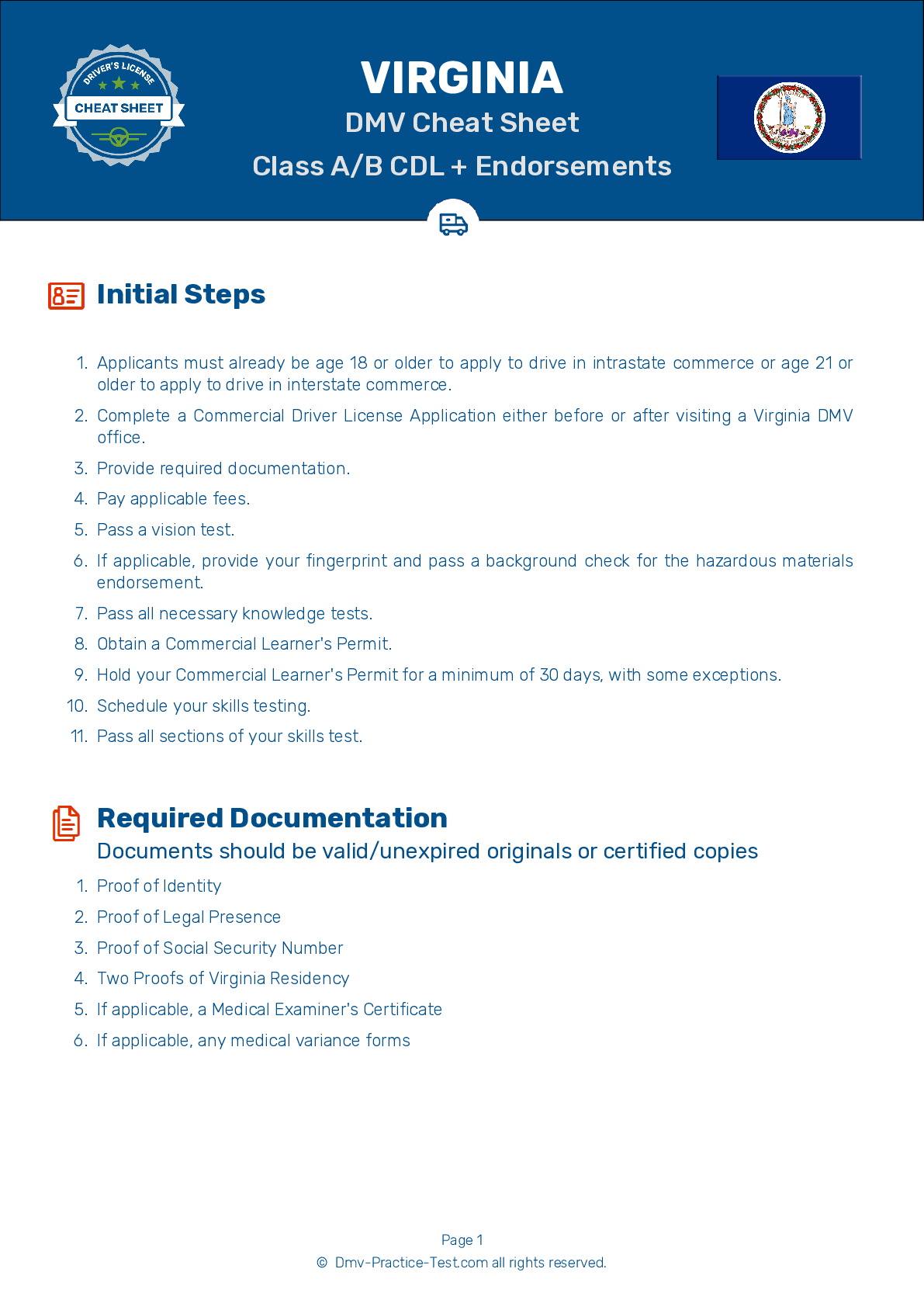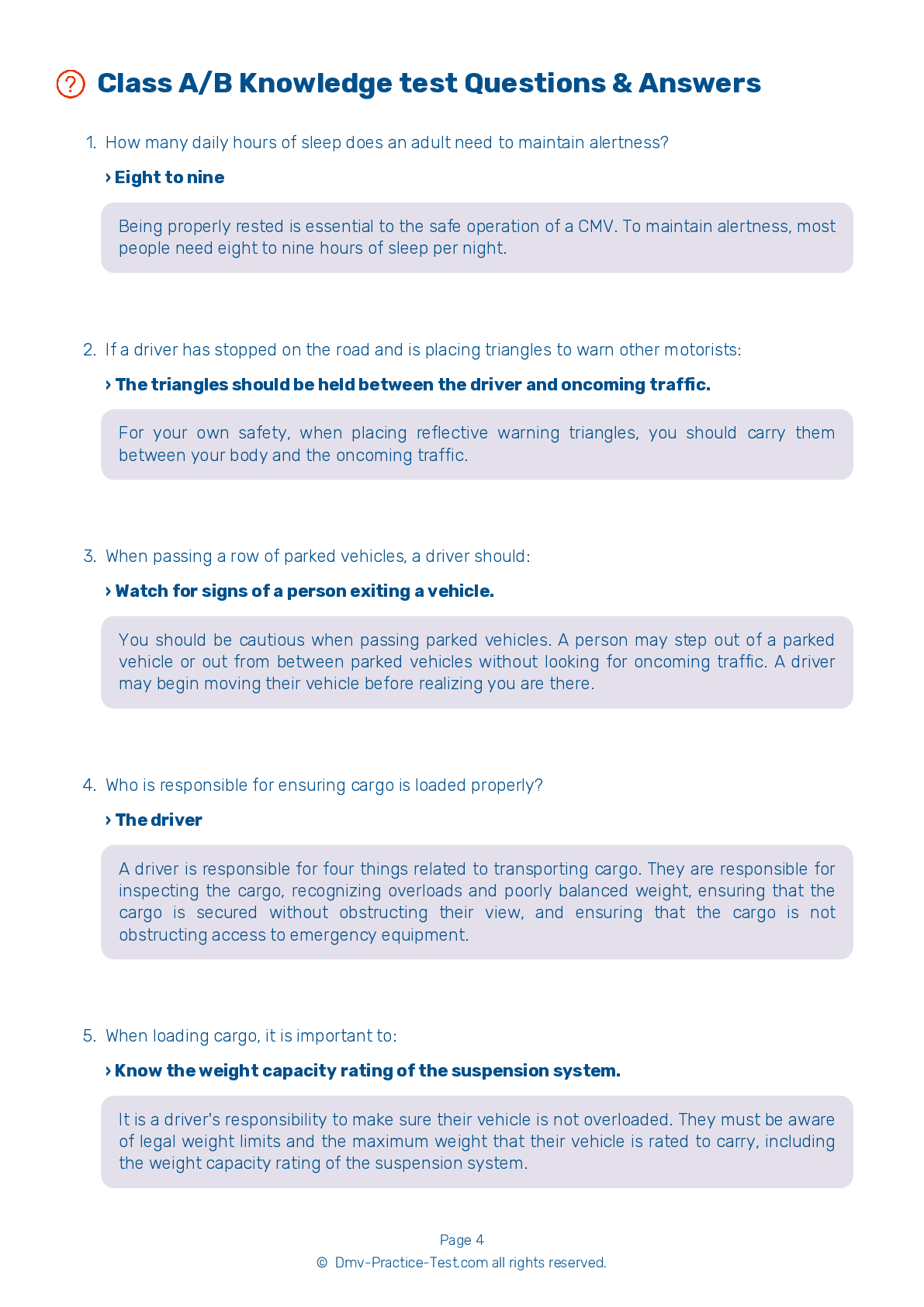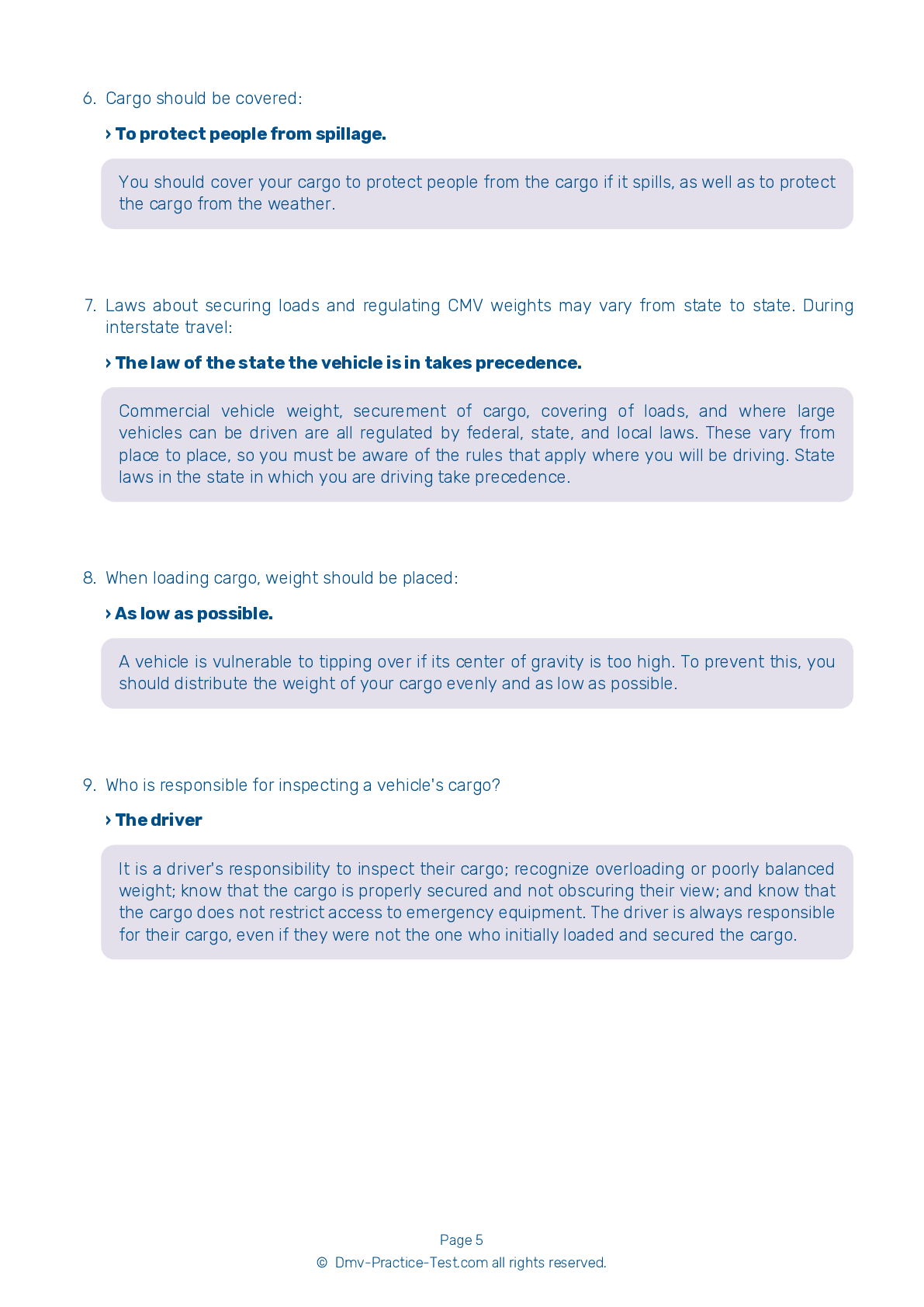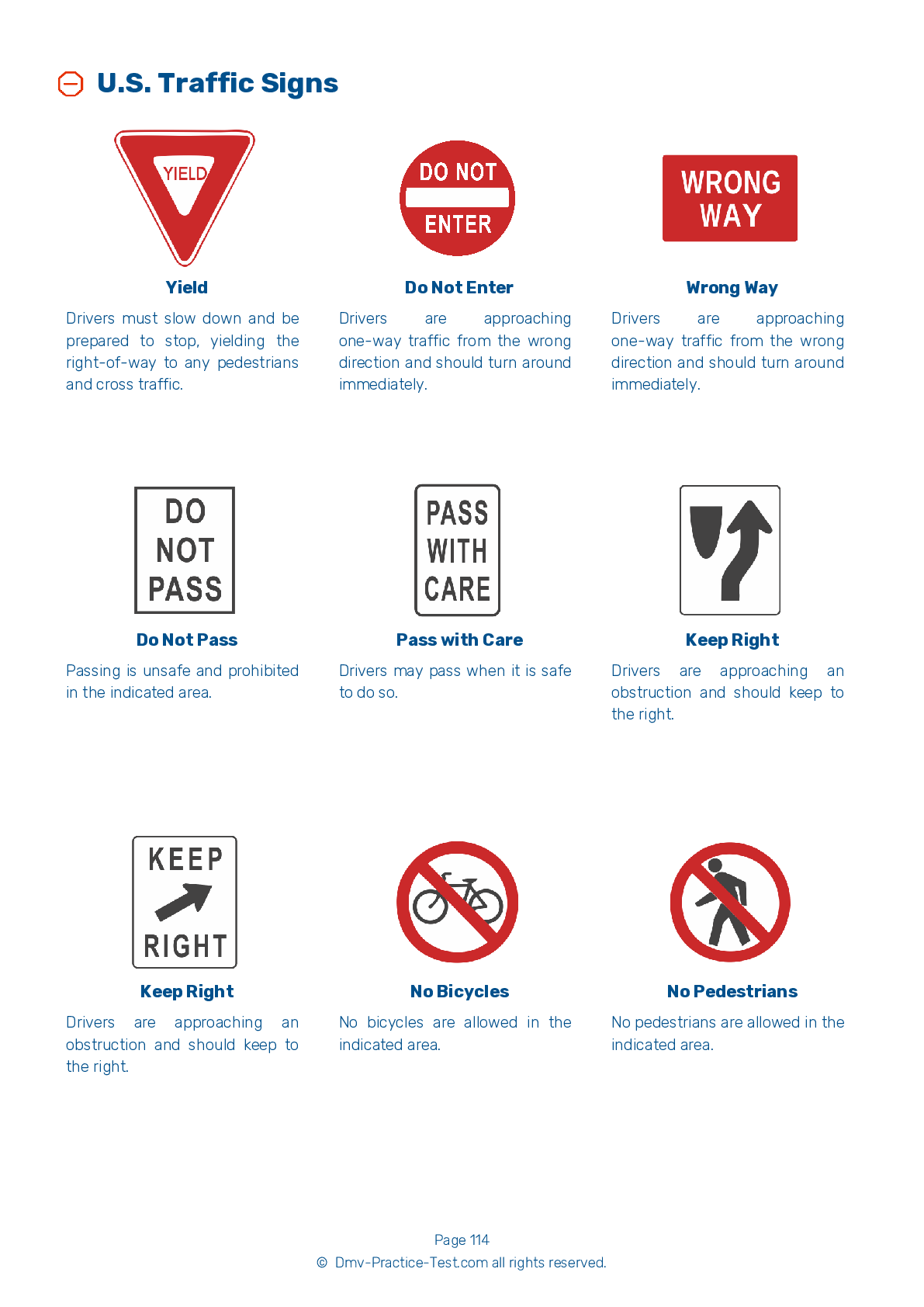Knowledge Test Class B #1
Class B Driving Test | Virginia 2026 #1 Page 6 of 7
Train for FREE online with our Virginia class B license test. The official exam test consists of several obligatory parts, with all of them checking your knowledge of different blocks of road rules. If you need to obtain a VA CDL class B permit in 2026, practice as much as possible. Free sample tests published on our website will help you check and improve your knowledge and boost your grades. Please bear in mind that CDL class B requirements may vary from state to state.
50
40
20
36 . Blocking is used to:
Blocking may be used on all sides of a piece of cargo to keep it from sliding while the vehicle is in motion.
37 . When transporting a load, you should inspect the cargo:
Cargo and its securement must be inspected every time you take a break during a trip. Be sure to inspect the cargo at least every 150 miles.
38 . When using a fire extinguisher on a fire, you should:
When using a fire extinguisher, you should stand as far away from the fire as possible. Aim the extinguisher at the base of the fire, not at the flames. If you are not sure which kind of extinguisher should be used on a fire, particularly a hazardous materials fire, you should wait for the firefighters to arrive and allow them to extinguish it.
39 . Which of the following is not a cause of hydraulic brake failure?
Most cases of hydraulic brake failure come from one of two causes. The brakes may fail due to a loss of hydraulic pressure or due to overuse on long hills, causing the brakes to fade.
40 . If a vehicle is equipped with a retarder and the vehicle's drive wheels have poor traction:
When a vehicle's drive wheels have poor traction, the use of a retarder may cause them to skid. A retarder should be turned off when a vehicle is being driven under wet, icy, or snowy conditions.
41 . When a vehicle is started, the coolant temperature should:
After an engine is started, the coolant temperature should begin a gradual rise toward the normal operating range.
42 . When it’s difficult to see, such as at dawn or dusk, a driver can increase their vehicle's visibility by:
When driving at dawn, at dusk, or in inclement weather, you should use your headlights on their low beam setting to increase your visibility.
2026 Virginia | Frequently Asked Questions
In Virginia, a Commercial Driver's License (CDL) Class A is defined as a license that allows the holder to operate any combination of vehicles with a Gross Combination Weight Rating (GCWR) of 26,001 lbs or more, provided the Gross Vehicle Weight Rating (GVWR) of the vehicle(s) being towed is over 10,000 lbs. It includes tractor-trailers, truck and trailer combinations.
A Class A CDL license in Virginia allows holders to operate vehicles such as tractor-trailers, truck and trailer combinations, tank vehicles, livestock carriers, and flatbeds. The vehicles can have a Gross Combination Weight Rating (GCWR) of 26,001 lbs or more, provided the towed vehicle(s) have a Gross Vehicle Weight Rating (GVWR) over 10,000 lbs.
To obtain a Class A CDL license in Virginia, you must be at least 18 years old (21 for interstate driving), have a valid Virginia driver's license, pass a vision test, and complete a self-certification process. You'll also need to pass knowledge and skills tests, including general knowledge, combination vehicle, and air brakes tests. Medical examinations may also be required.
In Virginia, to qualify for a Class A Commercial Driver's License (CDL), you must be at least 21 years old. This age requirement is set to ensure that drivers have the maturity and experience needed to handle large commercial vehicles on both intrastate and interstate highways.
In Virginia, specific endorsements are not required for a Class A CDL license, but they can broaden your driving capabilities. Endorsements such as Hazmat (H), Tank (N), Passenger (P), and School Bus (S) may be added after passing additional written and skills tests. These allow you to transport hazardous materials, drive tank vehicles, passenger vehicles, and school buses respectively.
The Class A CDL skills test in Virginia encompasses three parts: a pre-trip vehicle inspection, a basic vehicle control test, and an on-road driving test. The pre-trip inspection assesses your ability to inspect your vehicle before driving. The basic control test evaluates your ability to maneuver and control the vehicle. The on-road test assesses your ability to safely operate the vehicle in various traffic situations.
Yes, Class A CDL license holders may face limitations based on their specific endorsements or lack thereof. For instance, without a Hazardous Materials endorsement, they cannot transport hazardous materials. Additionally, restrictions can be placed on a CDL due to the driver's physical condition, such as needing corrective lenses or an automatic transmission restriction.
Yes, it is possible to take the written Class A CDL test in languages other than English in Virginia. The Virginia Department of Motor Vehicles (DMV) offers the test in various languages. However, federal regulations require that all CDL applicants demonstrate proficiency in English to ensure safety on the roads.
Yes, accommodations can be requested for the Class A CDL written test in Virginia if you have a disability. These may include accessible facilities, extra time, or other necessary adjustments. It's recommended to contact the Virginia Department of Motor Vehicles (DMV) in advance to discuss your needs and ensure appropriate accommodations can be provided.
Yes, you can retake the Class A CDL written test in Virginia if you don't pass on your first attempt. You must wait at least 15 days before retaking the test. There's no limit to how many times you can retake the test, but each attempt will require a new testing fee.



